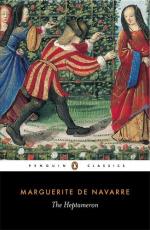|
This section contains 9,416 words (approx. 32 pages at 300 words per page) |

|
SOURCE: “Inmost Cravings: The Logic of Desire in the Heptameron,” in Critical Tales: New Studies of the Heptameron and Early Modern Culture, edited by John D. Lyons and Mary B. McKinley, University of Pennsylvania Press, 1993, pp. 3-24.
In the following essay, Cottrell argues that the Heptameron is guided by spiritual concerns, despite the explicitly worldly themes of the stories.
“Nous sommes tous encloz en peché.”
—“Novella 26,” Heptameron
“Omnes peccaverunt.”
—Romans 3.23 (Vulgate)
In the Prologue to the Heptameron, the ten stranded travelers—that is to say, the devisants in the frame-narrative—ask Oisille, the most venerable of the group, how they might best occupy themselves during the several days they must spend together while waiting for a bridge to be built. Oisille answers that the only remedy she has ever found for boredom and sorrow is “la lecture des sainctes lettres” (7;66) and explains that she spends her days reading...
|
This section contains 9,416 words (approx. 32 pages at 300 words per page) |

|


